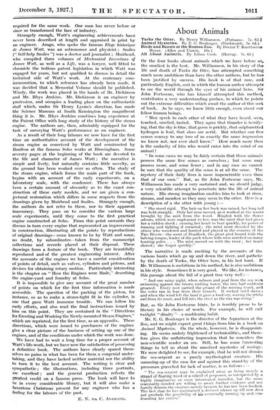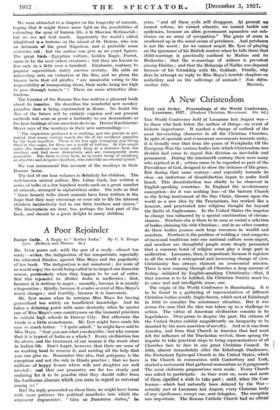About Animals
Meyer. (Allen and Unwin. 16s.)
All About Animals. By Lilian Cask. (Harrap. 7s. 6(1.) OF the four books about animals which we have before us, the smallest is the best. Mr. Williamson, in his story of the life and death of Tarka the Otter, has attempted something much more ambitious than have the other authors, but he has been justified by success. His book is of that rare, and particularly English, sort in which the human author attempts to see the world through the eyes of his animal hero. Sir John Fortescue, who has himself attempted this method, contributes a very understanding preface, in which he points out the extreme difficulties which await the author of this sort
of book. As he says, we know little enough, even about our fellow human beings.
" Men speak to each ,other of what they have heard, seen, touched, smelled, tasted. They agree that thunder is terrify- ing, that the sky is blue, that gorse is prickly, that sulphuretted hydrogen is foul, that sloes are acrid. But whether our five senses convey to any two of us exactly the same impression we know not, nor ever .shall know." How much more then is the audacity of him who would enter into the mind of an animal . " In some eases we may be fairly certain that those animals possess the same five senses as ourselves ; but some may possess more, and some fewer ; and in any case we cannot be sure that the quality of the sense is at all the same. The mystery of their daily lives is more impenetrable even than that of our own." But, as Sir John Fortescue says, Mr. Williamson has made a very sustained and, we should judge, a very scientific attempt to penetrate into the life of animal nature. His strong imagination enables him to look at river, stream, and meadow as they may seem to the otter. Item is a description of a she otter with young
She stood rigid. The hair on her hack was raised, her long tail was held straight. Only her nose moved, as it worked at the scents brought by the mist from the wood. Mingled with the flower odours, which were unpleasant to her, was the taint that had given her a sudden shock ; _causing her heart to beat quickly, for power of running and fighting if cornered ; the taint most dreaded by the otters who wandered and hunted and played in the country of the Two Rivers—the scent of Deadlock, the great pied hound with thus belying tongue, leader of the pack whose kills were notched 011 many hunting poles . . . The mist moved on with the river ; her heart slowed ; she forgot quickly."
The narrative is made exciting by the accounts of the various hunts which go up and down the river, and pathetic by the death of Tarka, the Otter hero, in his last hunt. If Mr. Williamson is ambitious in his method, he is also ambitious in his style. Sometimes it is very good. We like, for instance, this passage about the fall of a great tree very well : —
" And one rainy night, when salmon and peal from the sea were swimming against the brown rushing water, the tree had suddenly groaned. Every root carried the groans of the moving trunk, and the voles ran in fear from their tunnels. It rocked until dawn ; and when the wind left the land it gave a loud cry, scaring the white owl from its roost, and fell into the river as the sun was rising."
But, as Sir John Fortescue hints, he is terribly prone to be literary in his choice of words. For example, he will call twilight " dimity "—a maddening habit.
Mr. E. G. Boulenger is the director of the Aquarium at the
Zoo, and we might expect great things from him in a book on Animal Mysteries. On the whole, however, he is disappoint- ing. He seems unduly frightened of technicalities, and there- fore gives the unflattering impression that he considers the non-scientific reader an ass. Still, he has some interesting things to tell us about the unsolved mysteries of zoology. We were delighted to see, for example, that he will not dismiss the sea-serpent as a purely mythological creature. His summing-up of the case for and against this stand-by of the pressman gravelled for lack of matter, is as follows :- " The sea-serpent may he explained, away as being merely a strand of floating weed or a school of porpoises, as interpreted by a highly imaginative or even intoxicated traveller, but the more reasonably-minded are willing to await further evidence and not hastily dismiss the creature merely because he has not been hooked. The fact that he has maintained a discreet silence up till now does not preclude the possibility of Us eventually turning up and con- founding his critics." We were attracted to a chapter on the longevity of animals, hoping that it might throw some light on- the possibilities of extending the span of human life, a la Silesian Methuselah ; but _we are not told much. Apparently the world's oldest inhabitant is a tortoise on the island of St. Helena, who was an intimate of the great Napoleon, and is probably some centuries old ; but the author can give us no exact figures. The great birds—Egyptian vulture, Golden Eagle, Parrot, seem to be the next oldest creatures : but they are knoWn to live only to a little over a hundred. Elephants, contrary to popular superstition, rarely survive seventy. He. adds an interesting note on valuation at the Zoo,. and we glean. the bizarre facts that old giraffes " are unsaleable owing to the impossibility of transporting them, their necks being too high to pass through tunnels " There are some attractive illus-
trations. . .
The Curator of the Roman Zoo has written a pleasant book about its inmates. He describes the wonderful new monkey paradise that is being _constructed in Rome. NO doubt the Zoo of the future will be entirely ageless and our present methods will seem as great a barbarity to our descendants as the kear-baitings of our ancestors do to us. Doctor linottnerus= Meyer says of the monkeys in their new surroundings
" The impression produced is so striking, and the picture so ani- mated, that many visitors watch the life of the monkeys' paradise by the hour together. There is far less ugly wrangling and biting than'in the cages, for these are a result of tedium. In this ample space the monkeys can more easily keep at a distance from one another, and find more distraction, and are consequently more peaceable. But there is- oven here, as in every troup of monkeys, an absolute and despotic chieftain, who rules like an oriental tyrant."
We can recommend this account of the monkeys in their Roman home. . .
The last of our four volumes is definitely for children. The well-known animal •author, Mrs. Lilian Gask, has written a series of talks of a few hundred words each on- a great number of animals, arranged in alphabetical order. She tells us that " these homely talks about animals have been written in the hope that they may encourage or even stir to life the .interest, children instinctively feel in our little- brothers and sisters." The _illustrations are here, too, perhaps the best part of the book, and should be a great delight to many children.











































































 Previous page
Previous page